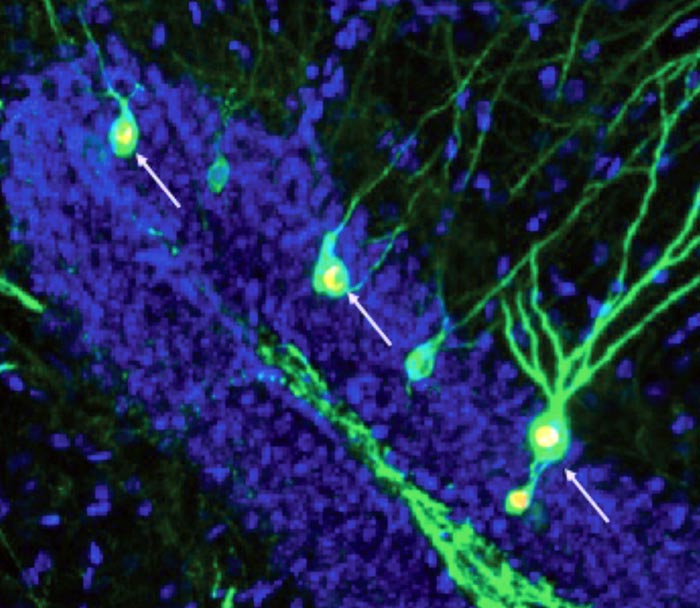Boosting neuron formation restores memory in mice with Alzheimer’s disease

The new study shows that boosting neurogenesis increases the number of newly formed neurons involved in storing and retrieving memories (arrows) in the hippocampus of mice with AD.
Credit: © 2022 Mishra et al. Originally published in Journal of Experimental Medicine. https://doi.org/10.1084/jem.20220391
Researchers at the University of Illinois Chicago have discovered that increasing the production of new neurons in mice with Alzheimer’s disease (AD) rescues the animals’ memory defects. The study, to be published August 19 in the Journal of Experimental Medicine (JEM), shows that new neurons can incorporate into the neural circuits that store memories and restore their normal function, suggesting that boosting neuron production could be a viable strategy to treat AD patients.
New neurons are produced from neural stem cells via a process known as neurogenesis. Previous studies have shown that neurogenesis is impaired in both AD patients and laboratory mice carrying genetic mutations linked to AD, particularly in a region of the brain called the hippocampus that is crucial for memory acquisition and retrieval.
“However, the role of newly formed neurons in memory formation, and whether defects in neurogenesis contribute to the cognitive impairments associated with AD, is unclear,” says Professor Orly Lazarov of the Department of Anatomy and Cell Biology in the University of Illinois Chicago College of Medicine.
In the new JEM study, Lazarov and colleagues boosted neurogenesis in AD mice by genetically enhancing the survival of neuronal stem cells. The researchers deleted Bax, a gene that plays a major role in neuronal stem cell death, ultimately leading to the maturation of more new neurons. Increasing the production of new neurons in this way restored the animals’ performance in two different tests measuring spatial recognition and contextual memory.
By fluorescently labeling neurons activated during memory acquisition and retrieval, the researchers determined that, in the brains of healthy mice, the neural circuits involved in storing memories include many newly formed neurons alongside older, more mature neurons. These memory-stowing circuits contain fewer new neurons in AD mice, but the integration of newly formed neurons was restored when neurogenesis was increased.
Further analyses of the neurons forming the memory-storing circuits revealed that boosting neurogenesis also increases the number of dendritic spines, which are structures in synapses known to be critical for memory formation, and restores a normal pattern of neuronal gene expression.
Lazarov and colleagues confirmed the importance of newly formed neurons for memory formation by specifically inactivating them in the brains of AD mice. This reversed the benefits of boosting neurogenesis, preventing any improvement in the animals’ memory.
“Our study is the first to show that impairments in hippocampal neurogenesis play a role in the memory deficits associated with AD by decreasing the availability of immature neurons for memory formation,” Lazarov says. “Taken together, our results suggest that augmenting neurogenesis may be of therapeutic value in AD patients.”
Mishra et al. 2022. J. Exp. Med. https://rupress.org/jem/article-lookup/doi/10.1084/jem.20220391?PR
About Journal of Experimental Medicine
Journal of Experimental Medicine (JEM) publishes peer-reviewed research on immunology, cancer biology, stem cell biology, microbial pathogenesis, vascular biology, and neurobiology. All editorial decisions on research manuscripts are made through collaborative consultation between professional scientific editors and the academic editorial board. Established in 1896, JEM is published by Rockefeller University Press, a department of The Rockefeller University in New York. For more information, visit jem.org.
Visit our Newsroom, and sign up for a weekly preview of articles to be published. Embargoed media alerts are for journalists only.
Follow JEM on Twitter at @JExpMed and @RockUPress.
Journal: Journal of Experimental Medicine
DOI: 10.1084/jem.20220391
Method of Research: Experimental study
Subject of Research: Animals
Article Title: Augmenting neurogenesis rescues memory impairments in Alzheimer’s disease by restoring the memory-storing neurons
Article Publication Date: 19-Aug-2022
Media Contact
Ben Short
Rockefeller University Press
bshort@rockefeller.edu
Office: 212-327-7053
All latest news from the category: Health and Medicine
This subject area encompasses research and studies in the field of human medicine.
Among the wide-ranging list of topics covered here are anesthesiology, anatomy, surgery, human genetics, hygiene and environmental medicine, internal medicine, neurology, pharmacology, physiology, urology and dental medicine.
Newest articles
Faster, more energy-efficient way to manufacture an industrially important chemical
Zirconium combined with silicon nitride enhances the conversion of propane — present in natural gas — needed to create in-demand plastic, polypropylene. Polypropylene is a common type of plastic found…

Energy planning in Ghana as a role model for the world
Improving the resilience of energy systems in the Global South. What criteria should we use to better plan for resilient energy systems? How do socio-economic, technical and climate change related…

Artificial blood vessels could improve heart bypass outcomes
Artificial blood vessels could improve heart bypass outcomes. 3D-printed blood vessels, which closely mimic the properties of human veins, could transform the treatment of cardiovascular diseases. Strong, flexible, gel-like tubes…





















